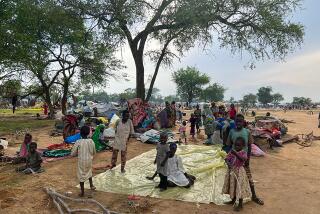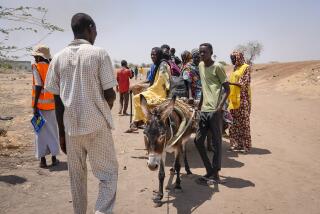Sudan’s Dinkas Drained by Bitter War : Dinkas of Southern Sudan Are Both Warriors and Victims of Bitter Rebel Warfare
- Share via
WAU, Sudan — Ngor Akuei Dor, a 22-year-old Dinka warrior, stands tall and proud in the scorching sun.
“I love to fight other clans,” the 6 1/2-foot tall tribesman said through an interpreter.
Healthy and dignified, he is visiting a refugee camp here, surrounded by 2,500 less fortunate fellow tribesmen living in wretched circumstances, refugees humbled by famine and Sudan’s civil war.
Dor came to this government-held town in south Sudan to sell three cows.
Like many members of his tribe, he is a subsistence farmer and a warrior in a region where tribal fighting, mainly over cattle and pastures, is common.
Sudan’s rebel force, the Sudan People’s Liberation Army, fighting the government in the south, is made up mainly of Dinkas.
But Dinkas, estimated to make up more than half of south Sudan’s 6 million people, are also the main victims of five years of bitter fighting.
“Rebels chased me on my 12-mile journey (to Wau) because they don’t want any . . . food arriving,” he said. “I ran and ran with my cows through the high dry grass which cut wounds in my legs.”
Wearing a half-sleeved pink and red striped robe down to his knees, he has the traditional forehead scars inflicted by tribal elders at puberty.
His lower teeth are missing, extracted during a tribal initiation rite.
The contrast between the strong, healthy Dor and the sea of sickly refugees in the camp is stark.
The war has forced at least 3 million southerners to flee their homes and seek sanctuary elsewhere in Sudan, or in Ethiopia and Uganda.
An estimated 250,000 southerners died of starvation and disease last year and the United Nations has said 100,000 could die this year.
Like other southern tribes, the Dinkas are mostly animists. Those who have adopted Christianity have blended tribal habits with their new faith.
The Dinkas are caught up in the rebel’s fight to end what it sees as domination of the south by the Muslim and Arabized north.
But Dinkas, resented because of their power, are often attacked by other southern tribes and Arab groups farther north.
“The Dinkas are the people who have really suffered from this war,” said Joseph Nyekini, Catholic bishop of Wau, 650 miles southwest of Khartoum.
He said they are disliked partly because they benefited more than other southerners from a 1972 pact with the government that gave the south partial autonomy.
The accord ended a 17-year rebellion launched by other southern tribes and which the Dinkas joined only belatedly.
“This is why non-Dinkas are staying away from the SPLA. They learned the lesson of the last war,” the bishop said.
“Why fight if the Dinkas are the ones who will end up with all government jobs when there is peace?” he said.
More to Read
Sign up for Essential California
The most important California stories and recommendations in your inbox every morning.
You may occasionally receive promotional content from the Los Angeles Times.












